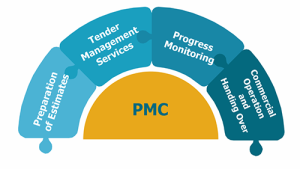
Project Management Consultancy (PMC) involves providing expert guidance, support, and oversight throughout the lifecycle of a project. PMC services are typically offered by experienced project management professionals or consulting firms with a focus on ensuring that projects are delivered successfully, on time, within budget, and according to predefined quality standards. Here are the key aspects of what

Project Management Consultancy entails:
- Project Planning and Strategy: PMC begins with thorough planning and strategy development. Consultants work closely with clients to define project objectives, scope, deliverables, timelines, and resource requirements. They develop comprehensive project plans outlining tasks, dependencies, milestones, and risk management strategies.
- Resource Allocation and Management: PMC involves identifying the necessary resources (including personnel, equipment, and materials) required for project execution. Consultants assist in resource allocation, procurement, and management to ensure that the right resources are available at the right time and within budget constraints.
- Stakeholder Management: Effective communication and collaboration with stakeholders are critical for project success. PMC professionals facilitate stakeholder engagement, gather requirements, address concerns, and manage expectations throughout the project lifecycle. They ensure that stakeholders are informed, involved, and supportive of project goals and outcomes.
- Risk Management: Identifying, assessing, and mitigating risks is an integral part of PMC. Consultants conduct risk assessments, develop risk mitigation plans, and implement proactive measures to minimize potential disruptions to project progress. They monitor risk factors continuously and take corrective actions as needed to keep the project on track.
- Quality Assurance and Control: PMC includes implementing processes and standards to maintain high-quality project deliverables. Consultants establish quality assurance frameworks, conduct regular inspections, and perform quality control checks to ensure that project outputs meet predefined quality criteria and client expectations.
- Schedule and Budget Management: PMC professionals closely monitor project schedules and budgets to ensure adherence to predefined constraints. They track progress, identify variances, and implement corrective measures to mitigate schedule delays or cost overruns. They provide accurate reporting and forecasting to keep stakeholders informed about project status and financial performance.
- Change Management: Projects often encounter changes in requirements, scope, or priorities. PMC consultants facilitate change management processes, assess the impact of proposed changes, and make recommendations for adjustments to project plans. They ensure that changes are properly documented, approved, and implemented while minimizing disruption to project progress.
- Closure and Evaluation: At the end of the project, PMC involves facilitating project closure activities, including finalizing deliverables, obtaining client acceptance, and conducting lessons learned sessions. Consultants assess project performance, identify successes and areas for improvement, and document valuable insights to inform future projects.
Overall, Project Management Consultancy encompasses a wide range of activities aimed at providing clients with the expertise, guidance, and support needed to deliver successful projects. By leveraging industry best practices, proven methodologies, and experienced professionals, PMC helps organizations achieve their project objectives efficiently and effectively.